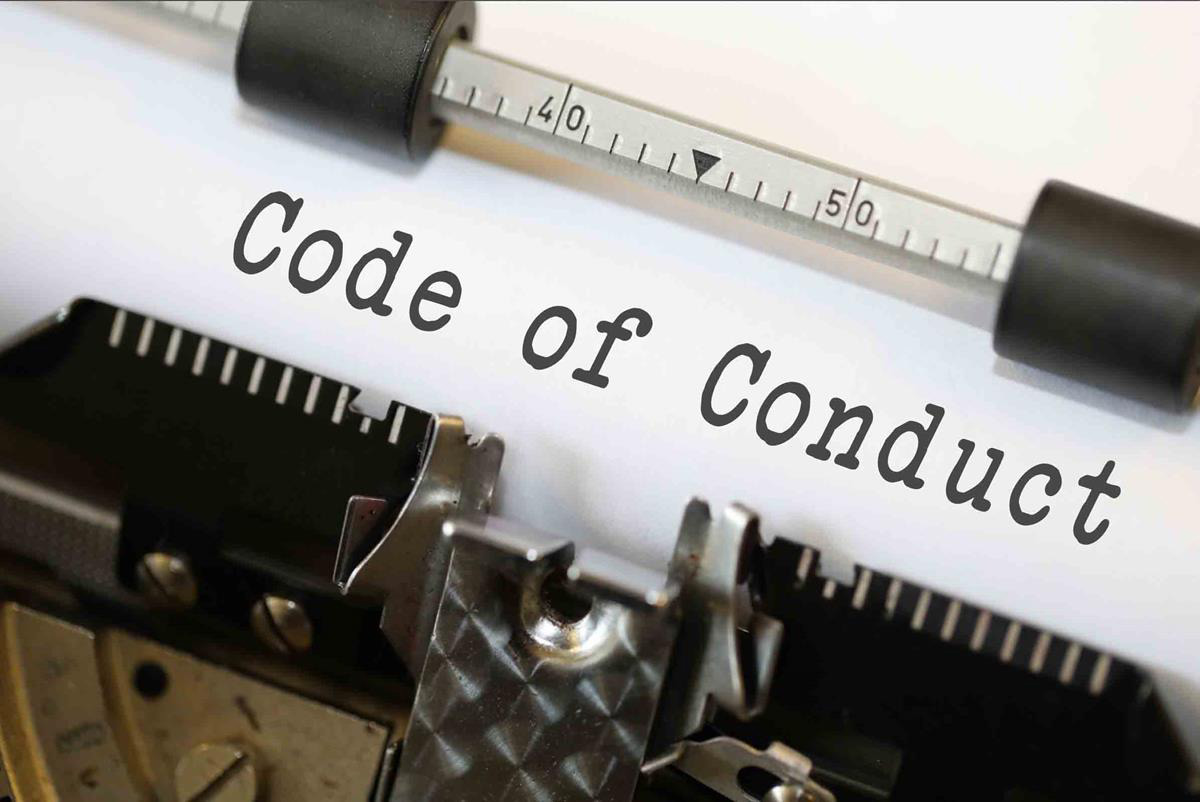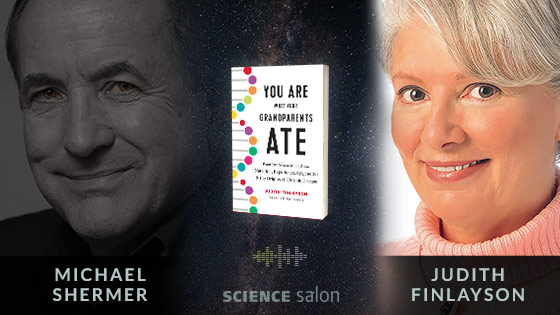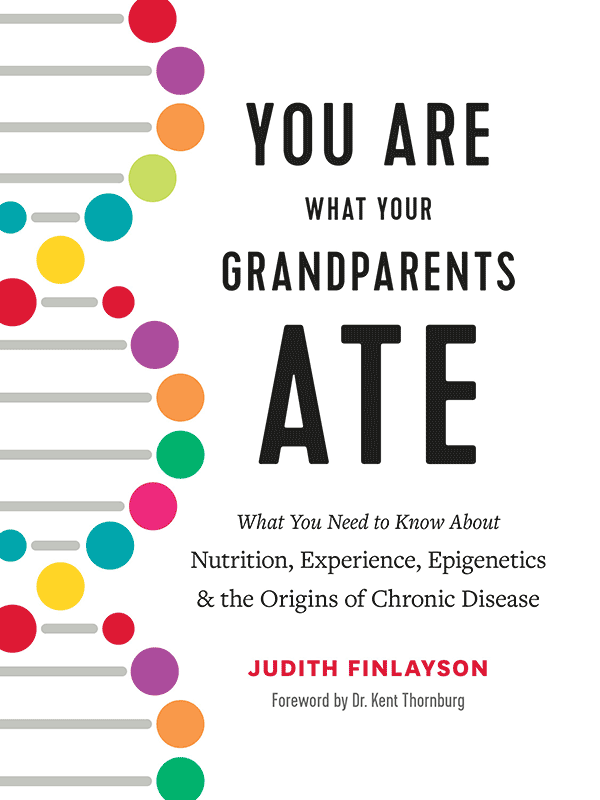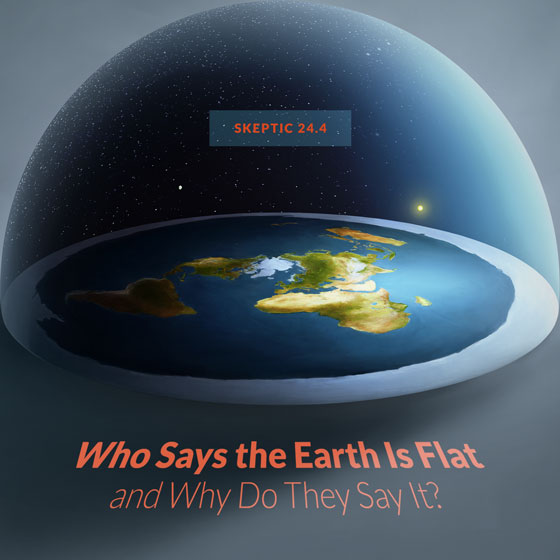SCIENCE SALON # 104
Michael Shermer with Judith Finlayson — You Are What Your Grandparents Ate: What You Need to Know About Nutrition, Experience, Epigenetics and the Origins of Chronic Disease
In this wide ranging conversation Judith Finlayson reviews the research she writes about in her new book that takes conventional wisdom about the origins of chronic disease and turns it upside down. Rooted in the work of the late epidemiologist Dr. David Barker, it highlights the research showing that heredity involves much more than the genes your parents passed on to you. Thanks to the relatively new science of epigenetics, we now know that the experiences of previous generations may show up in your health and well-being. Shermer and Finlayson discuss:
- epigenetics and the link to epidemiology
- why it is so difficult determining causality in medical sciences
- why correlation is not necessarily causation, but how it can be used to advise on diet and lifestyle changes
- How many of the risks for chronic diseases, including obesity, type 2 diabetes, high blood pressure, heart disease and dementia, can be traced back to your first 1,000 days of existence, from the moment you were conceived?
- the association between these diseases and the experiences parents and even grandparents had
- fruits and vegetables or meat and fat?
- how poverty affects epigenetics, and
- epigenetic exaggerations and incautious extrapolations — no miracles promised!
Judith Finlayson is a bestselling author who has written books on a variety of subjects, from personal well-being and women’s history to food and nutrition. She is a former national newspaper columnist for The Globe and Mail, magazine journalist and board member of various organizations focusing on legal, medical and women’s issues. Judith lives in Toronto, Canada.
Listen to the podcast via Apple Podcasts, Spotify, Google Podcasts, Stitcher, iHeartRadio, and TuneIn.
Check Us Out On YouTube.
Science Salon • Skeptic Presents • All Videos
You play a vital part in our commitment to promote science and reason. If you enjoy the Science Salon Podcast, please show your support by making a donation.
THE GREAT COURSES PLUS
Get unlimited access free for an entire month!
They say knowledge is power. Thanks to The Great Courses Plus we get to tap into this power with just a click. With this streaming service, unlock unlimited access to objective, reliable, fascinating information on virtually any subject. Learn from the brightest minds around the world, benefit from their years of experience and unique insight to help formulate our own knowledge and perspectives, so we can transform from a student into a master! With over 40 thousand 5-Star Reviews on The Great Courses Plus, you’re guaranteed to find compelling content.
Tap into this power of knowledge! Join me — and thousands of other learners — and sign up for The Great Courses Plus. For a limited time only, my listeners will get unlimited access completely free for an entire month! So don’t wait, sign up to start your Free Month Trial today. Simply use my special URL: thegreatcoursesplus.com/salon.

Carol Tavris avers that organizations’ Codes of Conduct that try to specify each and every possible behavior they wish to prohibit (or encourage), will find themselves in linguistic and psychological quicksand.
ABOVE: Code of Conduct by Nick Youngson CC BY-SA 3.0 ImageCreator
How Would You Design a “Code of Conduct”?
If you have attended a conference in the past decade, you undoubtedly will have been alerted to the sponsoring organization’s Code of Conduct, detailing how you must behave, or what you must not do, or what other people must not do. Organizations are spending considerable time and effort to create Codes of Conduct meant to govern the behavior of their members at meetings. The codes try to specify precisely what behavior will evoke censure, if not ejection from the meeting (or even the organization).
Words matter. An organization’s statement of its mission and values tells members which truths it holds to be self-evident. Yet once an organization tries to specify each and every one of the possible behaviors it wishes to prohibit (or encourage), it will find itself in linguistic and psychological quicksand. It’s like telling a child not to eat the gumballs, muffins, or chocolates on the table, but failing to forbid the ice cream and pie. The overall concept — no sweets — is lost.
I had assumed that organizations produce codes of conduct to reduce the risk of being sued for harassment. “Look how we meticulously specified inappropriate behavior that will not be tolerated,” they can say. But when Sarah Brookhart, Executive Director of the Association for Psychological Science, consulted their attorney, she was strongly advised against having any kind of such code or policy “because of the liability it creates.” Brookhart told me that the code of conduct issue varies among science organizations. “For some it comes out of rampant harassment at their conferences,” she wrote in an email. “For others it seems more symbolic than a response to an actual problem at conventions. I also think it reflects conditions for women in many academic departments.” For example, she said, harassment is an especially serious problem for disciplines where women are very much the minority.
Consider two very different Codes of Conduct, which anchor the ends of the spectrum of approaches. One comes from the Society for the Scientific Study of Sexuality (SSSS) and its Sexual Harassment Task Force, which recently created a Statement of Values and Expectations, a Code of Conduct, and a set of procedures for handling violations of the code. When a draft of the document was sent to all members for their comments, president Eric R. Walsh-Buhi reported that “approximately half of those that responded wanted a less restrictive policy and the other half wanted a more restrictive policy.” That alone might have made the board question the very plausibility of its efforts to specify every kind of behavior that all would agree is a “violation,” but no. The final document, approved by the organization’s Board of Directors and its attorney, is five single-spaced pages. The president acknowledged the length problem in his message to members, justifying it by asserting that “these documents have important legal implications,” and therefore “must be as precise as possible to ensure that cases of reported misconduct are handled consistently, predictably, and fairly.” […]












